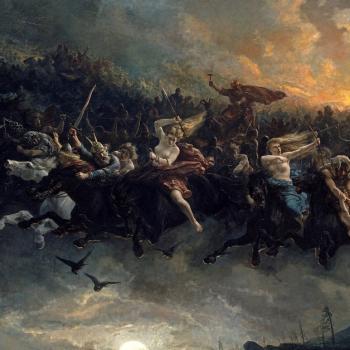The first time I felt the thrill of the Gods was when I picked up Mythology, the book about the Greek and Roman Gods, by Edith Hamilton. Amazingly, this book is still a bestseller to this day, despite being published in 1942. These Gods were my first love. I like to say they were my “Gateway Gods” because they opened the doors to several other cultures of study, spiritual work, and practice.
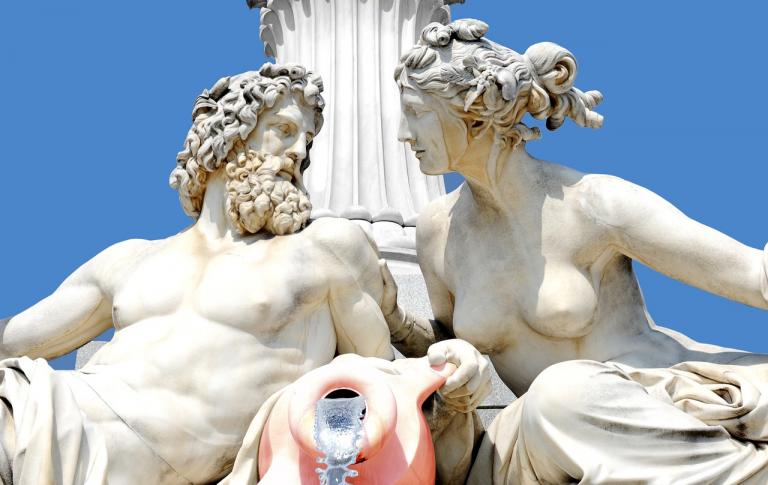
Some of you may remember the term “gateway drug” being used to describe how pot could induce its users to become more likely to try other drugs. I think that was a failing of the “Just Say No” movement, because other, more harmful drugs were all grouped together with it, and pot isn’t terribly harmful compared to, say, heroin. However, the concept of something being a “gateway” to other things stuck with me through the years. The concept came to me again during my studies of Hellenism, because the Greek and Roman pantheons were my first Gods.
Here are a few reasons why it’s highly probable that your first taste of paganism was also with the Greek and Roman pantheons, but not necessarily your last.
1. There’s a Wealth of Information About The Greek and Roman Gods
Because nine of the top ten mythology books rated on Goodreads are about the Greek Gods, if you pick up any book about mythology or the Gods, it’s more likely to be about those pantheons.
Due to the wealth of writing that survived from the Greek and Roman eras, we know quite a bit about daily life and religious practices. People appear to love books about Ancient Greece and Rome, possibly more than any other books about ancient religions. According to Goodreads, all ten of the top ten books in Ancient History are about them or that time.
There also appear have been more books published on their history than almost any other ancient history. Contrast this amount of information to what we have about the Celts and Vikings, who didn’t have written records, and whose work only appeared after the pagan culture had been active for centuries. Take, for example, that lovely God Cernunnos. I love him, just as so many do, but I wish there had been more words written about him. Even just one book. Conversely, when I say Zeus, you probably have a lot to say about him.
This wealth of knowledge helps modern-day people understand the ancient cultures and their worship.
2. The Greek and Roman Gods Look Like Us Humans
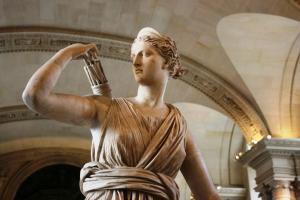
Greek and Roman statues show the Gods as human, only more divine. The archetypes they represent are still accurate and relevant to this day, and are attractive because of that. I might even go as far to say the Greek and Roman pantheons have stronger archetypes than most other cultures to modern day people.
I believe this is because their cultures resemble ours to a certain degree. We’re told from an early age that Greece was the birthplace of democracy. Our cultures look fairly similar in the terms of classes, taxes, religious tolerance, and emphasis on war or defense. However, I’d like to think we’re more advanced ethically than the Greeks or Romans, because women and minorities have more rights, and slavery and rape are outlawed.
Our cultures are similar enough that you’ll especially see a difference if you compare the GrecoRoman Gods to a tribal society’s Gods. If you want to see an ever greater difference, compare them to the notion of a Christian God, who is unknowable, without a face. There’s hardly any archetype there besides a heavenly father.
3. The Greek and Roman Gods Are Responsive When Called Upon
Most of the times that I’ve called upon the Greek and Roman pantheons, they’ve worked with me. That’s huge. I can’t say that for all Gods or pantheons. I tried to connect with some Gods and was rebuked; however, the Greek and Roman pantheons seem to give as much as they get, and possibly more. That kind of responsiveness can mean that people will keep using them before any other Gods. This may help new pagans open that portal in the mind and strengthen those neural pathways.
Perhaps the easiest Goddess I ever worked with was Hestia. I bought a bronze statue of her and put her over my south altar fireplace mantel. It only took one shotglass of wine for her to bless my home with a great vibe. I call upon her when I host company, and she makes sure the energy is fun.
4. The Greek and Roman Gods Appeal to Young People
I can’t tell you how often I see references to the Greek and Roman Gods on Witchblr. If you don’t know what that is, it’s the hashtag on Tumblr which is notoriously populated by young people, me, and a few other people over the age of 29. “Aphrodite taught me how to love myself” is about as ubiquitous as selfies. It’s amazing and beautiful that the younger crowds have found her and her immense ability to foster love.
Today’s youth culture is mirrored in the ancient cultures, which also admired youth and fitness. Artemis and Apollo are eternal youths, strong and capable. Even Athena, the goddess of wisdom, is represented as an athletic girl.
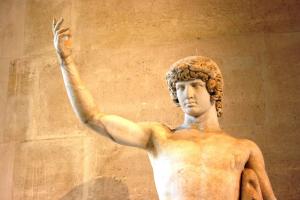
The Greek and Roman Gods may also appeal to young people due to their younger-minded specialities such as love, witchcraft (Hecate), and drinking (Dionysis). Add to this the plethora of children’s books about the Gods such as Percy Jackson, and you’ll see other attractions and relatable characters to young people.
5. They Opened My Way to Greater Paganism
Once I read all I could about the Greek and Roman Gods, I had a thirst for more knowledge, specifically, about my own ancestry cultures. The familiarity of those Gods and the pervasiveness of their culture gave me confidence to look into other ancient religions. They helped open the way to several other pantheons and spiritualities, but they’ll always be my first love and my right hand for most of my spiritual practice.
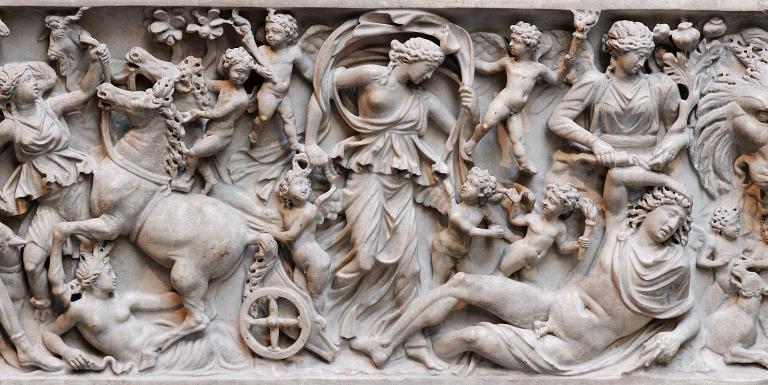
So what about you? Did the Greek and Roman Gods spark your interest when you were a pagan noob or a witchlet too? Did you grow your practice from there?
I’d love to hear your opinions. Comment below or in social media to discuss. Until next time.
* bright blessings *







